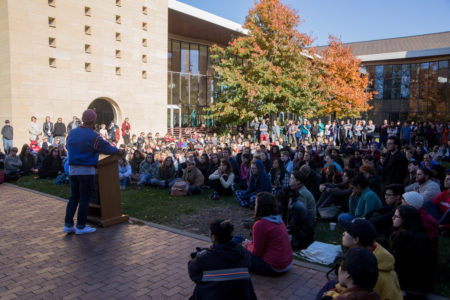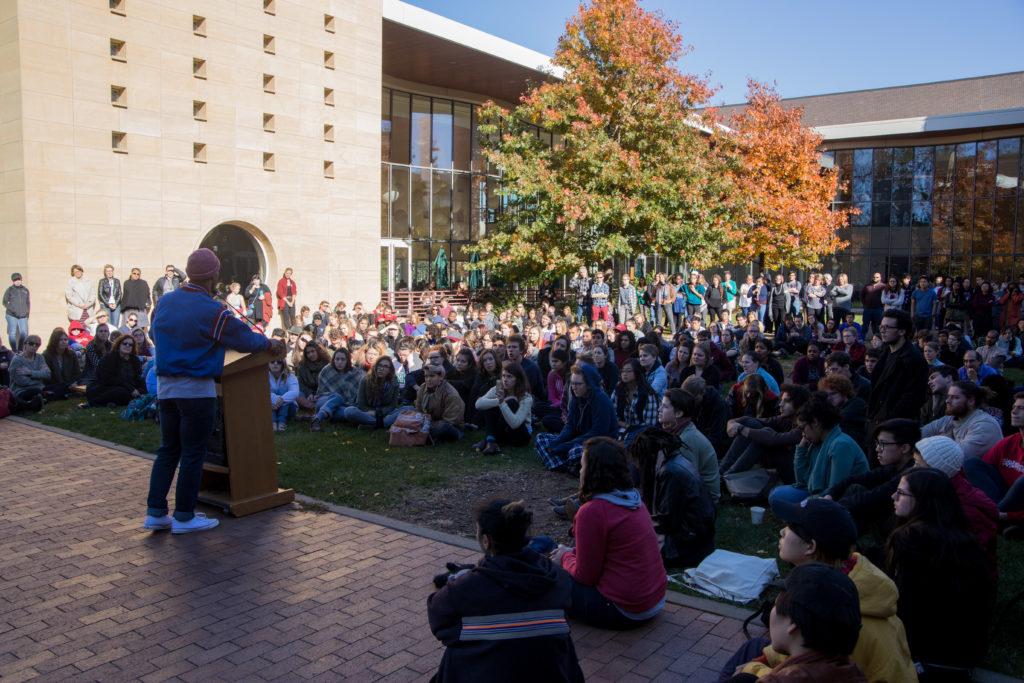By Emma Friedlander
friedlan@grinnell.edu
Grinnellians flocked to various locations throughout campus Tuesday night to view the results of the 2016 general election. Anticipation of a sweeping Hillary Clinton victory turned to surprise, shock and fear for some as they were hit with the realization that political outsider Donald Trump would win the United States presidency.
Anna Schierenbeck ’18, co-chair of Grinnell Campus Democrats was working in Lyle’s pub at a campus watch party as the news came in. After pouring hours into political field organization throughout the campaign cycle, Schierenbeck was shocked at Trump’s unexpected win.
“I wish I had given more thought to the idea that there could be a Donald Trump presidency,” Schierenbeck said. “I was so surprised, and I’m mad at myself for not thinking that this could be real. I don’t know if I ever took this seriously enough.”
Despite the sweeping Republican victory at all levels of government, including in Poweshiek County, Campus Democrats saw unprecedented success this year in getting college students out to vote. Grinnellians contributed 616 early votes, which, in combination with votes cast on Nov. 8, surpasses the 683 votes cast in 2012 and 591 votes cast in 2008.

“As a campus organization we really, really did everything we could. We have record breaking early vote numbers this year and got a residential agreement we got to happen with the College,” Schierenbeck said. “We worked hard and we did everything we could, but as a national consciousness, we could have taken this a lot more seriously.”
Almost immediately following the announcement of Trump’s victory, students Alice Herman ’18, Michelle Risacher ’17 and Simone Downs ’17 began to organize a campus-wide conversation about the result. At 1 p.m. on Wednesday, students, faculty, staff and other community members convened in the JRC courtyard to share their thoughts and concerns.
“The first thing that came to my mind as the results were coming through was that I wanted to be around people who were processing it as well,” Herman said. “We thought it would be a time when people were emotionally compelled to skip class or take time out of their schedule to gather and do something.”
Throughout the afternoon, individuals spoke about processing the result, what this means for the nation and how to move forward from here.
“This is the first time that I can say categorically that student initiative brought tears to my eyes,” said Professor Katya Gibel Mevorach, Anthropology, about the student organized discussion. “It was amazing to be that fast.”
The 1 p.m. discussion was followed by another community discussion at 4 p.m. in the Harris Center, organized by College administration. The event was preempted by a campus memo that President Raynard Kington sent out earlier that day, expressing the College’s support for students during this trying time.
“Every institution has the obligation to respond any time something is this penetrating and pervasive in creating concerns,” Kington said. “The Trump campaign violated so many principles of a liberal arts institution. Usual rules about presidents and institutions not engaging in a political contest needed to be thrown out the window. Finally what I acknowledged was, in order to achieve the goal of helping a lot of students deal with a really complicated and painful issue … that was worth the smaller chance that a smaller number of students might be by hurt our response.”
Later on Wednesday night, the Student Government Association (SGA) released the Resolution to Reaffirm Support for Impacted Students, Staff and Faculty on Grinnell’s Campus via email and Facebook. The resolution was written by Toby Baratta ’17, SGA Diversity Officer, in collaboration with Cassidy Hilburn ’19, alumni and other students A direct response to the Republican election victory, the resolution aimed to articulate the need for continuing support on campus for those who feel concerned or endangered by the changing political climate.
“It says something when the entire Campus Council, which is supposed to be representative of all students, [agrees on] something,” Baratta said.
While SGA recognizes that not all students feel the same way about the election, the resolution does solidify their rejection of hateful attitudes associated with Trump’s victory.
“Everyone on this campus has the right to vote in their own way. Many students may have voted for Trump for reasons other than racism or xenophobia,” Baratta said. “We are condemning the behaviors and actions that are specifically bringing harm to people on this campus rather than individual’s behaviors.”
Although shock from the election is fresh for many, others are already beginning to assess how this unexpected political result occurred and what democrats and progressives need to do going forward. Many who spoke at Wednesday’s events pointed to the polarization present in our own community, epitomized by the divide between those at the College and those in the town.
“For people in this town, they point at this campus and the people that work here and go to school here as examples of elite liberalism,” said Professor Patrick Inglis, sociology. “We talk about this bubble on and on but it’s true. Had Clinton won, it would have been a party atmosphere yesterday. But for the people who walk into Rabbitt’s [Tavern] at 7 a.m. after getting off the night shift and drink whiskey for a few hours, nothing would have changed for them had Clinton won. Or the janitorial staff that shows up at 5 or 6 a.m. and leaves by 11 and goes off to some other job, that we don’t talk to, … the dishwashers or people who work in the Dining Hall from the town make less than student workers. That wouldn’t have changed.”
President Kington and Angela Voos, Chief of Staff, also recognize the need to breach the town-and-gown divide during these polarizing times. They encourage efforts on an individual basis.
“I’m thinking about joining a local fraternal organization that I would never otherwise think of joining. Because at the core, that’s who voted. Part of the problem and the shock comes from the fact that many of us had no interaction with anyone who would admit that they were going to vote for Trump,” Kington said. “They could have the chance to see me differently and I might have the chance to see them differently.”
Students and academics are also grappling with how and why this outcome happened. Because data forecasts and media coverage so heavily favored a Clinton victory, many are second-guessing or reconsidering the approach towards and usefulness of data in political campaigns. These steps forward also require reassessing the existing political structure in the United States and how democrats should change or regroup.
“I’m not one who discounts polling data, but at its best … what you have is a behavioral indication, what someone says about what they’re thinking or what they’re doing. It’s really hard to get a measurement that reliably, accurately or validly reflects that,” said Professor Barbara Trish, Political Science. “I really don’t think the forecasts of a Clinton presidency were any signs of bias in the media — it’s just a prediction that things will turn out the way they usually do.”
Despite many concerns about the consequences of a Trump presidency, especially in conjunction with a Republican House and Senate and a likely right-leaning Supreme Court, Trish looks to historical precedent to think realistically about the implications of Trump’s term in office.
“I hesitate to put myself in Donald Trump’s mind, but I suspect that he, like every president, will experience how difficult it is to get anything done,” Trish said. “Even though you have unified republican control, not only do you have institutional tensions, but also those individual members of congress who are tied to their own constituencies. … Governing is completely different than the campaign or election season, for all presidents.”
In these early days following the election, perhaps the greatest focus for Grinnell’s campus is processing and planning the next steps to secure and revitalize every person’s safety, rights and ability to evoke change.
“Personally, I want to see institutionalized structures change,” said Anita Dewitt ’17, SGA President. “This is something I’ve been pushing for a while. This event is huge and there’s going to be immediate response that is detrimental and violent. But a lot of people who are not privileged, every single day of their lives, it’s the same struggle. It’s just that other people realized it today.”




































































Craig • Nov 15, 2016 at 8:29 am
“…Usual rules about presidents and institutions not engaging in a political contest needed to be thrown out the window. Finally what I acknowledged was, in order to achieve the goal of helping a lot of students deal with a really complicated and painful issue … that was worth the smaller chance that a smaller number of students might be hurt by our response…”
This statement from Dr. Raynard Kington, the President of a liberal arts college that prides itself, make that defines itself, as a beacon of inclusiveness and diversity, flies directly in the face of those very principles. If, as a society, we are to make decisions and policy that may hurt the minority as a concession to the feelings of the majority, then we must completely rethink the very tenets of the Progressive ideology. Transgender bathrooms immediately come to mind; certainly a concession to an extremely small minority that, absolutely, offends the senses of a much larger majority. And yet, nothing short of Federal Law enforces this provision.
Perhaps the aforementioned “…usual rules…” are there for a reason. When you make it your aim to preach tolerance, your words must be supported by your actions.